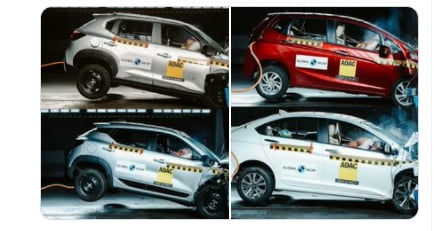Global NCAP has reached the 50 model milestone for cars tested in the Indian market with the announcement of the progamme’s new crash results today. Four cars are included in this latest phase of the #SaferCarsforIndia campaign, the Nissan Magnite, Renault Kiger, Honda Jazz and the Honda City (4th Gen).
Alejandro Furas, Global NCAP Secretary General said,
“This is an important milestone moment for our crash testing in India, with fifty models tested to date. There has been significant progress on vehicle safety design since we began our tests in 2014 but, as we see from our latest results, there is still more to be done to achieve the high safety standards that consumers in India rightly demand.
“It has been encouraging to see some leading Indian manufacturers respond so well to the #SaferCarsforIndia challenge, but also rather disappointing that major global brands fall short on safety in India whilst comfortably exceeding these requirements in other global markets.”
David Ward, President of the Towards Zero Foundation said,
“As we pass the #SaferCarsforIndia fifty test milestone, it’s important to recognise the progress that has been made. Automakers are rising to the challenge set by Global NCAP with new models increasingly achieving a five star safety performance. For some Indian manufacturers this has become a must have validation of their commitment to safety.
“We warmly welcome the Indian governments proposal to require six airbags in new cars. Together with the introduction of our new assessment protocols in July this year, the combination of regulatory push and market pull will continue to help shape a market for safety in India.”
Nissan Magnite (2 airbags)
The Nissan Magnite scored four stars for adult and two for child occupant protection. The Magnite was tested in its most basic safety spec fitted with two front airbags and ABS. During the assessment the model showed a stable structure and marginal protection to the driver’s chest.
Surprisingly, the model is still being sold with a lap-belt in the rear centre seat instead of three point belts, without ISOFIX anchorages for the Child Restraint Systems (CRS). There is no Electronic Stability Control (ESC) and no side head impact protection as standard.
Renault Kiger (2 airbags)
The Renault Kiger, which shares platform with the Nissan Magnite, achieved four stars for adult and two stars for child occupant protection. The Kiger was tested in its most basic safety spec fitted with two frontal airbags and ABS. During the assessment it showed an unstable structure and marginal protection to the driver’s chest. The model offers ISOFIX anchorages but they are not visible to the consumer, they were covered by the seat fabric. This model is offered with a lap-belt in the rear centre seat, without ESC and side head impact protection as standard.
Honda Jazz (2 airbags)
The Honda Jazz achieved four stars for adult and three stars for child occupant protection. The Jazz was tested in its most basic safety spec, fitted with two frontal airbags and ABS. During the assessment it showed a stable structure. The Jazz does not have ISOFIX anchorages and for this reason the CRS were tested using the adult seatbelts. Honda decided to install both child dummies in a rearward facing position following global best practice. This model is offered with a lap-belt in the rear centre seat, without ESC and side head impact protection as standard.
Honda City (4th Gen) (2 airbags)
The Honda City (4th Gen) achieved four stars for adult and child occupant protection. The City (4th Gen) was tested in its most basic safety spec, fitted with two frontal airbags, ISOFIX anchorages and ABS. During the assessment it showed an unstable structure and footwell area, good child occupant protection thanks to the ISOFIX anchorages and the rearward facing position of one of the child dummies. This model is offered with a lap-belt in the rear centre seat, without ESC and side head impact protection as standard.
Global NCAP’s #SaferCarsForIndia project currently tests frontal crash protection for occupants only. Side impact, ESC and pedestrian protection assessments will form part of Global NCAP’s updated assessment protocols in India as from July 2022.







